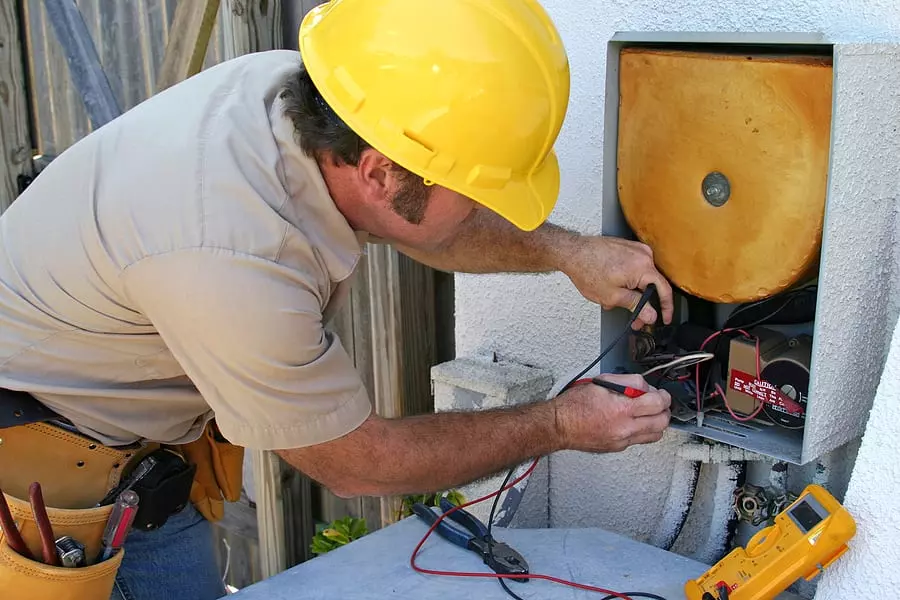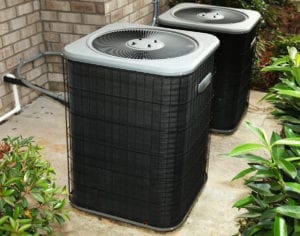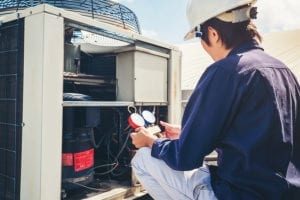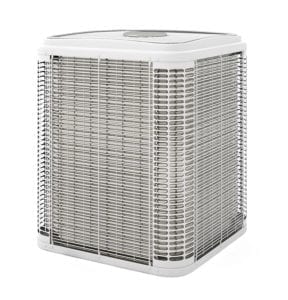How Much Does Central AC Installation Cost in 2023?
Installing a new central air conditioning system will cost somewhere between $6,000 and $14,500. Thinking about Central AC? We break down what you need to know about central AC installation cost, effectiveness, and who to call for the job.

You can keep your cool in the summer by installing central air conditioning.
In the height of summer, pushing your fan to the max just doesn’t cut it. Alternatively, central air can serve as your solution for a cool summer.
COMPARE QUOTESHowever, central AC is a big-ticket purchase. Accordingly, it’s helpful to know more about the cost of AC installation to prepare for your investment in cooling comfort.
Central AC Units Costs and Things to Consider
The price of a central air conditioning unit is only one point that you need to consider. For example, you also need a contractor to evaluate your home for installation. Usually, they’ll charge a fee for the service. The below chart explains the average AC unit cost, and does not include installation.
COSTS
| Central A/C Unit Size | *BTU’s (British Thermal Units) | **AC Unit Cost | |
|---|---|---|---|
| 1.5 Tons | 18,000 BTU | $2,450 – $5,924 | |
| 2 Tons | 24,000 BTU | $3,510 – $5,697 | |
| 2.5 Tons | 30000 BTU | $3,740 – $6,090 | |
| 3 Tons | 36000 BTU | $3,900 – $6,259 | |
| 3.5 Tons | 42000 BTU | $4,260 – $6,400 | |
| 4 Tons | 48000 BTU | $4,540 – $7,300 | |
| 5 Tons | 60000 BTU | $5,604 – $8,250 |
You may believe that you’ll save on the installation because you already have ductwork. However, this isn’t always the case. Order ductwork cannot handle the airflow of today’s updated central AC systems.

Things to Consider
When considering the installation of a Central AC (Air Conditioning) unit, there are numerous factors to bear in mind. Here are three primary considerations:
- Size and Capacity:
- Right Sizing: The size of the AC unit should be appropriate for the space it’s intended to cool. A unit that’s too small won’t cool your home efficiently, while a unit that’s too large will cycle on and off frequently, leading to increased wear and potentially higher energy costs.
- Load Calculation: Before choosing a unit, have a professional perform a Manual J load calculation. This calculation considers various factors such as the size of the home, insulation levels, window types, and local climate conditions to determine the appropriate cooling capacity needed.
- Efficiency and SEER Rating:
- SEER Rating: The Seasonal Energy Efficiency Ratio (SEER) rating indicates the efficiency of the air conditioner. A higher SEER rating means greater energy efficiency, which can lead to lower energy bills. Current minimum standards for SEER ratings vary depending on geographic regions, but it’s often beneficial to invest in a unit with a SEER rating higher than the minimum requirement for potential long-term savings.
- Energy Star: Look for AC units that have the ENERGY STAR label. These models meet strict energy efficiency guidelines set by the U.S. Environmental Protection Agency and can save you money over the unit’s lifespan.
- Installation and Placement:
- Professional Installation: The efficiency and longevity of a central AC unit can be significantly impacted by the quality of its installation. It’s crucial to choose a reputable HVAC contractor who has a track record of quality installations.
- Unit Placement: The external component of the AC (the condenser) should be placed in a location where it won’t be exposed to direct sunlight for prolonged periods, which can reduce its efficiency. Additionally, ensure there’s adequate airflow around the unit and that it’s not placed near heat sources or areas where debris like leaves can accumulate.
Beyond these primary considerations, also factor in warranty terms, potential maintenance and servicing needs, and compatibility with existing systems (like ductwork). These can influence the overall cost and performance of your central AC system.

3 Tips to Save Money on Central AC Installation Cost
While investing in a central AC system is essential for many households, there are ways to manage the costs associated with installation. Here are three tips to help save money on central AC installation costs:
- Research and Obtain Multiple Quotes:
- Multiple Bids: Get estimates from at least three reputable HVAC contractors. This will not only give you an idea of the average cost for your area but also allow you to compare services, warranties, and installation practices.
- Negotiate: Some contractors may be willing to match or beat competitors’ prices, or they might offer discounts for installing during the off-season when they’re less busy.
- Look for Rebates and Incentives:
- Utility Company Offers: Some utility companies offer rebates or discounts for installing energy-efficient systems. Before finalizing your AC purchase, check with your local utility company or visit their website to see if they have any ongoing promotions.
- Federal and State Tax Credits: Occasionally, the government provides tax credits for homeowners who install energy-efficient appliances, including central AC units. Check the U.S. Department of Energy’s website or your state’s energy department for potential tax credits or rebates.
- Opt for a System that Fits Your Needs:
- Avoid Over-sizing: While you want a system powerful enough to cool your home effectively, choosing a unit that’s too large for your needs can be unnecessarily expensive. Have a professional perform a Manual J load calculation to ensure you’re getting a size that’s just right for your home.
- Consider Mid-range Models: While the top-of-the-line units with the highest SEER ratings will be the most energy-efficient, they also come with a premium price tag. Often, mid-range models offer a good balance of cost and efficiency that can save you money upfront while still providing energy savings in the long run.
Remember, while it’s tempting to cut costs upfront, it’s essential to consider long-term efficiency and durability. A slightly higher initial investment in a quality installation or a more efficient model can save you money in the long run through reduced energy bills and fewer repair costs.

Also, don’t wait until the height of summer to schedule the installation. During the coldest and hottest months of the year, HVAC contractors are extremely busy.
Instead, schedule the installation for the spring or fall if possible. By scheduling the installation during the off-season, you may pay less for installation and the contractor may finish the job faster.
Also, try to find equipment rebates and tax credits that will help offset the cost of installation. For example, local municipalities, utility companies, and manufacturers offer incentives to promote the installation of high-efficiency air conditioners. You can use the Energy Star Rebate Finder to learn more about incentives in your area.
Keep Your Central Air Humming Along
Central AC is a big investment. Accordingly, it makes sense to keep it maintained.
For example, it’s important to change the air filters once a month. Dirty air filters cause restricted airflow and result in air conditioner inefficiency.
 When you buy new filters, choose one with a high minimum efficiency reporting value (MERV). Filter manufacturers rate their products on a scale of one to twelve. The higher the number, the more efficient the filter.
When you buy new filters, choose one with a high minimum efficiency reporting value (MERV). Filter manufacturers rate their products on a scale of one to twelve. The higher the number, the more efficient the filter.
Make sure your home is properly insulated. You can check your home for leaks. If air leaks out of your windows are ductwork, your air conditioning system will only have to work harder.
You can find leaks by lighting an incense stick and following the trail of smoke to find drafts.
Finally, it’s a good idea to schedule annual maintenance appointments with a trusted HVAC contractor.
COMPARE QUOTESTop 10 Central Air Conditioners
Air conditioners have become a necessity in today’s world, especially in areas where the summers are hot and humid. There are different types of air conditioners available in the market, but central air conditioners are the most preferred ones. Central air conditioners are efficient and can cool an entire house quickly. Here’s our latest list of the top 10 AC units:
- Carrier Infinity 21: Carrier Infinity 21 is one of the best central air conditioners available in the market. It has an efficiency rating of up to 21 SEER, making it highly efficient. The Carrier Infinity 21 comes with a two-stage compressor that reduces the noise level and provides better temperature control.
- Lennox XC25: Lennox XC25 is another highly efficient central air conditioner with a SEER rating of up to 26. It is also equipped with the latest technology that helps it to run quietly and smoothly.
- Trane XV20i: Trane XV20i has a SEER rating of up to 22, making it one of the most energy-efficient central air conditioners available in the market. It has a variable speed compressor that helps it to run quietly and provides better temperature control.
- Rheem Prestige Series: Rheem Prestige Series is a high-performance central air conditioner with a SEER rating of up to 20. It is equipped with a two-stage compressor that provides better temperature control and reduces the noise level.
- American Standard Platinum 20: American Standard Platinum 20 is a highly efficient central air conditioner with a SEER rating of up to 22. It is equipped with a variable speed compressor that provides better temperature control and reduces the noise level.
- Goodman DSXC18: Goodman DSXC18 is a reliable and efficient central air conditioner with a SEER rating of up to 19. It is equipped with a two-stage compressor that provides better temperature control and reduces the noise level.
- York Affinity Series: York Affinity Series is a high-performance central air conditioner with a SEER rating of up to 18. It is equipped with a two-stage compressor that provides better temperature control and reduces the noise level.
- Amana ASXC18: Amana ASXC18 is a highly efficient central air conditioner with a SEER rating of up to 19. It is equipped with a two-stage compressor that provides better temperature control and reduces the noise level.
- Heil QuietComfort Deluxe Series: Heil QuietComfort Deluxe Series is a reliable and efficient central air conditioner with a SEER rating of up to 19. It is equipped with a two-stage compressor that provides better temperature control and reduces the noise level.
- Bryant Evolution Series: Bryant Evolution Series is a high-performance central air conditioner with a SEER rating of up to 20. It is equipped with a two-stage compressor that provides better temperature control and reduces the noise level.
Central air conditioners are an excellent investment for those who want to cool their entire house efficiently. The above-listed central air conditioners are some of the best available in the market. However, it is essential to do your research and choose the one that best fits your needs and budget.
Calculating to Cost of Central Air Conditioning
Central air conditioning is a popular choice for homeowners who want to maintain a comfortable temperature throughout their homes during the hot summer months. However, installing a central air conditioning system can be a significant investment. In this article, we’ll take a closer look at the cost of central AC installation and factors that can affect the price.

The cost of central AC installation can vary widely depending on several factors. One of the most significant factors is the size of the home. A larger home will require a larger central air conditioning system, which can be more expensive. On average, the cost of installing a central AC system in a 2,000 square foot home can range from $7,500 to $10,000.
Here are some typical costs associated with getting a new AC unit installed, broken down into bullets:
- The cost of the unit itself: This can vary depending on the type, size, and efficiency of the AC unit. Generally, you can expect to pay anywhere from $2,300 to $5,900 for a new central air conditioning unit, with larger and more efficient models being more expensive.
- Labor costs: The cost of installation will depend on the complexity of the job and the amount of time it takes. Generally, you can expect to pay between $2,000 and $4,500 in labor costs, with larger or more complex installations costing more.
- Ductwork modifications: If your home’s ductwork needs to be modified to accommodate the new unit, this can add to the installation cost. The cost of ductwork modifications can range from a few hundred dollars to several thousand dollars, depending on the extent of the modifications needed.
- Electrical upgrades: In some cases, electrical upgrades may be required to properly power the new AC unit. This can add several hundred dollars to the installation cost.
- Permits and inspections: Depending on your location, you may need to obtain permits and have the installation inspected by a local government authority. Permit fees can range from a few hundred to a few thousand dollars.
- Additional components: Depending on the specifics of your installation, you may need to purchase additional components such as thermostats, air purifiers, or UV lights. These additional components can add several hundred to several thousand dollars to the installation cost.
It’s worth noting that these costs are all estimates, and your actual cost may vary depending on a variety of factors, including your location, the size and complexity of the job, and the specific equipment and components you need.
Another factor that can affect the cost of central AC installation is the type of system being installed. There are two main types of central air conditioning systems: a split system and a packaged system. A split system consists of an indoor unit and an outdoor unit, while a packaged system has all the components located in a single unit. Packaged systems are typically less expensive to install than split systems, but they may not be as efficient.
AC Efficiency
The efficiency of the system being installed is another important factor to consider. A more efficient system will generally be more expensive, but it will also save you money in the long run on your energy bills. The efficiency of a central air conditioning system is measured by its Seasonal Energy Efficiency Ratio (SEER) rating. A higher SEER rating indicates a more efficient system, but it can also come with a higher price tag.

The complexity of the installation can also affect the cost. For example, if the installation requires significant modifications to the ductwork or electrical system, it will be more expensive. Additionally, if the installation requires the removal of an existing system, there may be additional costs associated with disposing of the old unit.
Labor Costs
Labor costs are another factor to consider. Ranging from $125/hour to $200 per hour, the cost of labor can vary depending on where you live and the experience level of the HVAC contractor. It’s important to get quotes from several contractors to compare prices and ensure that you are getting a fair price.
In addition to the installation costs, it’s also important to consider the ongoing maintenance and repair costs associated with a central air conditioning system. Regular maintenance is essential to keep the system running efficiently and to prevent breakdowns. Maintenance costs can range from $250 to $370 per year.
In conclusion, the cost of central AC installation can vary widely depending on several factors, including the size of the home, the type and efficiency of the system being installed, the complexity of the installation, and labor costs. It’s important to get quotes from several contractors to ensure that you are getting a fair price. Additionally, it’s important to factor in ongoing maintenance and repair costs when considering the overall cost of a central air conditioning system.
COMPARE QUOTES
It is good that you have shared tips on HVAC maintenance costs. At least now no contractor can ask for a high-price deal. I know they all are good people but you know exceptions are always there.
You made a good point that I should also think about the maintenance of the filters when it comes to getting a commercial air conditioning installation. I’d like to look for a good contractor for that soon because I’m interested in opening a parlor soon. I’m sure that keeping the place cool will be essential in keeping customers satisfied.
Although the costs to install a new HVAC system seems high at first, it’s actually much more affordable than you may think. We even saving money on our power bill every month by having a modern a/c.
Some of the best AC units will have high energy efficiency capabilities (also known as high SEER ratings) can save you a considerable amount of money on your average heating and cooling energy bill costs. However, a higher energy efficiency level may mean a higher HVAC installation cost.
Thank you so much for all the valuable information. I am so glad I found all the needed information on one single page. I had a company coming out to give an estimate, and they started – “let’s see how much you qualify for” and “do you want an efficient system”? That without even looking around, explaining. Now I know what to ask and what to look for. I will post your site on our Next door page too, so people get educated. Nowadays, unscrupulous companies are mushrooming.
In your “About Us” discussion, you should state who you are. Are you independent from product manufacturers? What process do you follow to objectively determine which products, etc. are the best. How do you prevent being influenced by the manufacturers?